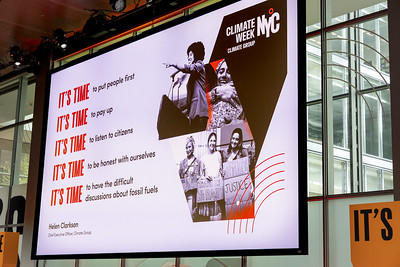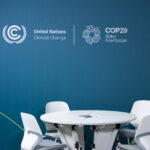Climate Week NYC 2024 kicked off with good intention. It’s time to prioritize people in the climate transition, ensuring it is just and equitable. The Global North must fulfill its responsibility by providing overdue climate finance to protect vulnerable communities in climate hotspots. Citizens overwhelmingly demand stronger climate action, with 80% globally supporting urgent measures. We must also be honest about the limitations of technology in addressing climate change. Additionally, difficult discussions on fossil fuels are crucial, including resolving geopolitical issues surrounding the final reserves of oil and pushing fossil fuel companies to shift toward sustainable business models. But in New York, it’s all about developing your own business 1.1. Being in the picture. It’s all very self-serving. Climate action is now happening elsewhere, and here’s why.
Research, Lawsuits, and Industry Milestones
Market Signals Encouraging Rapid Adoption of Sustainable Solutions
This year’s Climate Week NYC saw several major announcements and initiatives aimed at accelerating global climate action. One of the key highlights was new research led by Professor Tim Lenton from the University of Exeter in collaboration with Climate Group. The research focused on the concept of “cascading tipping points” and how governments can initiate positive tipping points to cut prices and carbon emissions. By switching investments from fossil fuels to clean technologies through policy mandates, this approach aims to spark a domino effect, encouraging rapid global adoption of sustainable solutions.
In another significant development, California Attorney General Rob Bonta, joined by actor Lou Diamond Phillips, announced a high-profile lawsuit against ExxonMobil. Bonta accused the company of perpetuating a “decades-long campaign of deception” that contributed to the global plastics pollution crisis. This lawsuit is part of a growing trend of climate litigation that holds large corporations accountable for their environmental impact.
Forty of the leading green banks in the United States, which collectively invested over $10 billion in clean energy projects last year, announced a new partnership. This initiative aims to coordinate efforts to drive a historic wave of clean energy investments across the country. By collaborating, these green banks hope to expand climate solutions to all corners of the U.S., supporting the nation’s clean energy transition.
The Taskforce on Inequality and Social-related Financial Disclosures (TISFD) was launched to address social issues in business and finance. It aims to create a global framework, connect social issues, and provide guidance on people-related risks. It will work with diverse stakeholders to ensure broad support.
Let’s be clear: It’s illustrative of a great combination of carrot-and-stick efforts to encourage the private sector to tackle the climate issue with the urgency it demands in 2024.
New Certification Schemes, Frameworks and Even More Reports
U.S. Steel and Responsible Steel made history with a first-of-its-kind certification. U.S. Steel’s Big River facility in Arkansas became the world’s first producer of ResponsibleSteel certified steel, marking a significant milestone in the decarbonization of the steel industry. This certification sets a critical example for the steel sector, which is a major contributor to global carbon emissions.
Additionally, the International Energy Agency (IEA), International Methane Emissions Observatory (IMEO), and the Environmental Defense Fund (EDF) presented a new framework for tracking emissions reductions in the oil and gas sector. This framework provides detailed guidelines for monitoring progress toward emissions and flaring targets set by oil and gas companies globally, building on the Oil and Gas Decarbonization Charter introduced at COP28.
The Climate Group and Ramboll also released a report on the steel and concrete industries, revealing that nearly 50% of surveyed businesses are willing to pay a premium for lower-emission materials. This signals a growing demand for decarbonized construction materials, which are crucial for reducing the carbon footprint of infrastructure projects worldwide.
That’s another series of discussions of great interest if you think about the role of construction materials among other industries, with very clear stake in climate change. Such initiatives are important to send a great signal to market and encourage transition to low carbon materials. And there have been many similar threads across multiple industries more or less material from a climate standpoint.
Innovative Climate Solutions and Government Regulatory Updates
Another Flurry of Commitments, Announcements and Open Letters
Innovation was a key theme during Climate Week NYC, with several companies and organizations launching groundbreaking projects. Asahi, a major global beverage company, launched its first Sustainability Innovation Project. This initiative aims to drive innovation toward achieving net-zero emissions and fostering sustainable business growth. The project underscores the increasing commitment of corporations to integrating sustainability into their core operations.
The International Energy Agency (IEA) also released a report examining the implications of implementing the full range of energy pledges made at COP28. The report, titled From Taking Stock to Taking Action: How to Implement the COP28 Energy Goals, warns of the risks of partial implementation. It stresses the importance of translating international climate goals into domestic energy policies to ensure meaningful progress toward limiting global warming to 1.5°C.
The Global Renewables Alliance, representing the renewable energy sector, published an open letter urging world leaders to set ambitious and actionable renewable energy targets in their upcoming Nationally Determined Contributions (NDCs). These revisions, due in February under the Paris Agreement, are critical to ensuring that global climate goals are met. The Alliance’s call for action reflects the urgent need for governments to ramp up their commitments to renewable energy adoption. In another major announcement, the Climate Group launched a new initiative focused on 24/7 carbon-free electricity. This initiative, supported by several founding partners of the 24/7 Carbon-Free Coalition, aims to reduce emissions by transitioning businesses to use carbon-free electricity around the clock, sourced locally. The initiative represents a bold step toward decarbonizing electricity consumption, a key component of the global energy transition.
How many Climate Week have already generated so many such announcements? Would have been great instead to track previous Climate Week similar flurry of Commitments, Announcements and Open Letters to see how they have translated into concrete mitigation of climate risks for our people and our planet.
Embarrassment: Climate Week NYC is in Fact Happening in the United States…
The US is sadly not at the forefront of climate action. Since the Kyoto agreements were signed nearly 30 years ago, American diplomacy has consistently endeavored to slow climate progress. Remember that at the time of the Kyoto agreements, which were not signed by the USA, it was Al Gore, not Trump, who was Vice President, and could not get approval of Congress. And it keeps on going. At a time when climate action needs to be professionalized and regulated, the USA is fundamentally pushing for leadership in deregulation and criticism of climate action.
On the regulatory front, the U.S. Securities and Exchange Commission (SEC) made headlines by disbanding its Climate and ESG Task Force, which was launched in 2021 to address misleading disclosures related to environmental, social, and governance (ESG) issues. This move comes amid a broader backlash against ESG initiatives, particularly from conservative groups. The expertise developed by the task force will officially now be distributed across the SEC’s enforcement division, but the future of ESG-related regulations remains uncertain, especially with the possibility of a Republican-controlled government that could challenge current climate policies.
Meanwhile, uncertainty surrounding the upcoming U.S. elections has clouded progress on global climate finance at the United Nations. The UN General Assembly, held just before Climate Week, was seen as the last major all-nations gathering before COP29, which will take place right after the U.S. election. Many nations are hesitant to make concrete commitments on climate finance until the outcome of the election is known, as U.S. policy will play a crucial role in shaping the future of global climate negotiations.
Climate and Energy Innovations: Tech and Carbon Markets
Is Tech Properly Investing in Pertinent Climate Solutions?
Tech giants like Google and Microsoft continue to play a significant role in funding the climate space. Google announced it would purchase 50,000 metric tons of carbon removal credits from a Brazilian startup by 2030. The startup, which reclaims degraded farmland and replants native Amazon rainforest species, is also working with Microsoft, which signed a deal last year to buy 1.5 million credits. Both companies are founding members of the Symbiosis Coalition, which aims to contract up to 20 million tons of carbon removal credits by 2030. These efforts highlight the growing importance of nature-based solutions in the fight against climate change.
We work at Ksapa on climate related solutions. In view of such programs, some key questions to ask simply gets back to the promises of Climate Week NYC 2024: What’s in for local people? Question was asked in a conference, and no response was provided. Nature-based solution programs cannot fly without putting local people at the center. Far from an Excel spreadsheet exercise computaing hectares and carbon credits, the robustness and pertinence of every program of this kind can work only when grounded in a robust value for local people: decent income and jobs, no competition of land for local needs, diversification of local economies among other considerations.
Is Nuclear Power a Good Spend of Money?
The growing demand for clean energy, particularly from the tech industry, is also driving a resurgence in interest in nuclear power. One of the most surprising announcements during Climate Week was the planned reopening of the Three Mile Island nuclear facility in Pennsylvania, the site of the worst reactor accident in U.S. history. Microsoft has agreed to purchase as much power as possible from the plant for the next 20 years. As companies like Microsoft and Amazon ramp up their artificial intelligence capabilities, they are increasingly looking to nuclear power to meet their 24-hour energy needs, as renewable sources like wind and solar may not be sufficient to provide the constant power required by AI processing. Before zooming on energy production, these companies can first explore whether and how to design more sober AI that requires less energy. For example through quantum approaches.
I have worked myself in the nuclear industry for a very limited period of time in my life. But that’s enough and grounded on way enough strategic and hands-on programs to make it loud and clear: There is no one size fit all solution to advance climate. In this regard, nuclear may have a role as much as a lot of other solutions. But nuclear faces major challenges including: Cost, at a time when scarcity of budget means that mony feeding limited nuclear plants cannot feed instead much more diverse set of other opportunities ; Adaptation, at a time when plants are generally not adapted to droughts, extreme weathers and therefore are essentially not adapted to climate change ; Scale, at a time when geopolitical and security considerations encourage most countries to explore other solutions than nuclear energy in their mix. Nuclear remains a niche solution for “happy few”, generating externalities impacting “the many”, and by no means a scalable solution capable to provide any meaningful contribution to climate urgency.
Conclusions: Action is Elsewhere and Not in NYC Anymore
Climate Week NYC 2024, beyond its flurry of announcement to calibrate in comparison of previous Climate Weeks generated again discussions on concepts, taxonomy and language at a time when the event itself would encourage action. For example, the public discourse on ESG has also evolved, with some experts calling for a reevaluation of the concept. An article in the Harvard Business Review argued that ESG as a unified concept has become too broad and vague, leading to backlash against what some critics call “woke” investing. The article suggested that corporate leaders should adopt a two-pronged approach: first, identify and address the environmental and social issues most material to their financial performance, and second, invest in solutions that mitigate the company’s most negative impacts on society. Okay – Is 2024 with climate urgency in background good time to name things differently? Or instead stop making announcement to basically start working harder on GHG emission reduction?
Climate Week NYC 2024 was of course marked by a series of important announcements, ranging from groundbreaking research on tipping points to innovative corporate sustainability projects and regulatory updates. But as the world faces the urgent challenge of addressing climate change, these initiatives need to translate into concrete programs demonstrating how the diverse approaches being taken by governments, corporations, and financial institutions have provent to drive progress toward a more sustainable future with concrete data to put in front of concrete 1.5 degree trajectories.
Luckily, this is where we focus our time and efforts at Ksapa. Contact us to know more. Join the movement for climate action.
Author of several books and resources on business, sustainability and responsibility. Working with top decision makers pursuing transformational changes for their organizations, leaders and industries. Working with executives improving resilience and competitiveness of their company and products given their climate and human right business agendas. Connect with Farid Baddache on Twitter at @Fbaddache.






